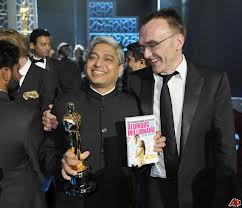 In the framework of Europalia India, a string of institutions including my Alma Mater, the Katholieke Universiteit Leuven, hosts a series of exhibitions, performances, films showings, conferences and lectures. Last Tuesday and Wednesday, Tehelka editor Tarun Tejpal was to speak in Brussels and Leuven, but he didn’t show up, being detained in a sex scandal. The next day, on Thursday 21 November 2013, the speaker in Leuven was Vikas Swarup, philosopher-psychologist by diploma and diplomat by profession, but best known as the writer of the novel Q & A. This book was first published in Dutch translation in 2004, well before the English original came out. Unfortunately, I had (or made) no time to read his novel, until I saw its filmed version, Oscar-winning Slumdog Millionaire directed by Danny Boyle.
In the framework of Europalia India, a string of institutions including my Alma Mater, the Katholieke Universiteit Leuven, hosts a series of exhibitions, performances, films showings, conferences and lectures. Last Tuesday and Wednesday, Tehelka editor Tarun Tejpal was to speak in Brussels and Leuven, but he didn’t show up, being detained in a sex scandal. The next day, on Thursday 21 November 2013, the speaker in Leuven was Vikas Swarup, philosopher-psychologist by diploma and diplomat by profession, but best known as the writer of the novel Q & A. This book was first published in Dutch translation in 2004, well before the English original came out. Unfortunately, I had (or made) no time to read his novel, until I saw its filmed version, Oscar-winning Slumdog Millionaire directed by Danny Boyle.
Well, anyway, what followed was question time. I asked Vikas Swarup whether he was disappointed or otherwise not so happy with the changes Danny Boyle had made while turning the novel Q & A into the movie Slumdog Millionaire. He acknowledged that changes had been made. Upon signing the contract, the representative of the movie crew had promised him that “the soul of the novel” would be respected, a sure way of saying that its body would be distorted. But he took this as normal and fairly insignificant. In reality, the changes were highly consequential and significant for Boyle’s agenda and perhaps for what western audiences have come to expect from a film located in India.
 He explained how he had named the protagonist Ram Mohammed Thomas, representing every street kid in India, while Boyle had changed this into Jamal Malik, a fully Muslim name. He communalized the plot, with Jamal’s mother being killed by Hindu communal rioters and a Rama impersonation presiding over the violence. Boyle turned the protagonist into a poor hapless Muslim and the Hindus into the bad guys. In this context, blinding a child-beggar to make him earn more by singing a Hindu religious song (a practice of which even the missionary sister Jeanne Devos says she has never come across an actual case during decades of social work in Mumbai), and of course not a Muslim song, adds to the image of Hinduism as gruesome. Briefly, he turned an innocent story into an anti-Hindu story.
He explained how he had named the protagonist Ram Mohammed Thomas, representing every street kid in India, while Boyle had changed this into Jamal Malik, a fully Muslim name. He communalized the plot, with Jamal’s mother being killed by Hindu communal rioters and a Rama impersonation presiding over the violence. Boyle turned the protagonist into a poor hapless Muslim and the Hindus into the bad guys. In this context, blinding a child-beggar to make him earn more by singing a Hindu religious song (a practice of which even the missionary sister Jeanne Devos says she has never come across an actual case during decades of social work in Mumbai), and of course not a Muslim song, adds to the image of Hinduism as gruesome. Briefly, he turned an innocent story into an anti-Hindu story.
The fact that the writer, as a somewhat secularized Hindu, representative for dozens or even hundreds of millions of similar Hindus, fails to see the hostile intention and the very partisan effect of this manipulation, says a lot about the silly and ultimately suicidal mentality prevalent among Hindus. Only a community of sleep-walkers could willingly come to the humiliating situation of the Hindus in India and the flood of anti-Hindu slander in the media. –
































1 Comment